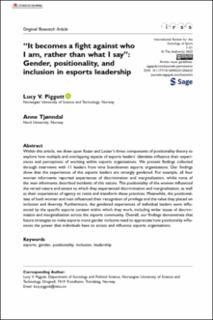“It becomes a fight against who I am, rather than what I say”: Gender, positionality, and inclusion in esports leadership
Peer reviewed, Journal article
Published version
Permanent lenke
https://hdl.handle.net/11250/3123062Utgivelsesdato
2023Metadata
Vis full innførselSamlinger
Sammendrag
Within this article, we draw upon Kezar and Lester’s three components of positionality theory to explore how multiple and overlapping aspects of esports leaders’ identities influence their experiences and perceptions of working within esports organisations. We present findings collected through interviews with 11 leaders from nine Scandinavian esports organisations. Our findings show that the experiences of the esports leaders are strongly gendered. For example, all four women informants reported experiences of discrimination and marginalisation, whilst none of the men informants described incidents of this nature. The positionality of the women influenced the varied nature and extent to which they experienced discrimination and marginalisation, as well as their experiences of agency to resist and transform these practices. Meanwhile, the positionalities of both women and men influenced their recognition of privilege and the value they placed on inclusion and diversity. Furthermore, the gendered experiences of individual leaders were influenced by the specific esports context within which they work, including wider issues of discrimination and marginalisation across the esports community. Overall, our findings demonstrate that future strategies to make esports more gender inclusive need to appreciate how positionality influences the power that individuals have to access and influence esports organisations. “It becomes a fight against who I am, rather than what I say”: Gender, positionality, and inclusion in esports leadership

